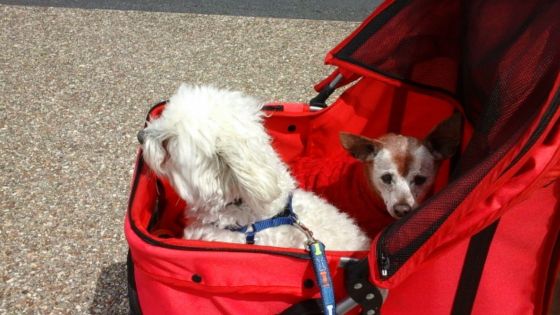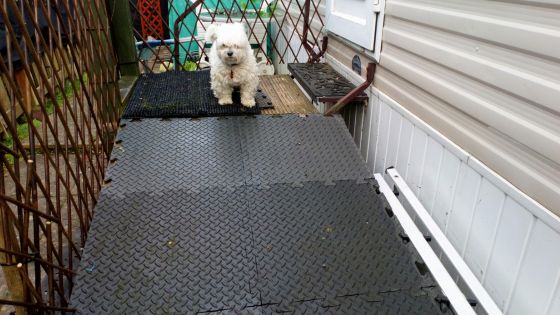As our canine companions age, it is common for them to undergo behavior changes that may seem perplexing to their owners. Understanding these changes can help pet parents provide the necessary care and support to their senior dogs.
If you notice any changes in your senior dog’s behavior, no matter how small you think it is, please see your vet. It may be nothing or it may be the beginning of a problem, so the sooner it’s caught, the easier it will be to fix or at least manage.
Physical Changes
Senior dogs often experience physical changes that can impact their behavior. They may move more slowly, have difficulty climbing stairs, or experience joint pain. These physical changes can lead to behavioral changes such as increased aggression or decreased activity levels.
There is some good news here, because there’s lots we can do to make things easier. For example, joint pain can be managed with things like medication, natural options such as green lipped mussels or turmeric golden paste, acupuncture and laser therapy to name a few. When their pain is managed or even resolved, their aggressive behavior should disappear (if pain was the cause).
Your dog may not be able to walk as long or as far as he used to, so take shorter walks and try a lifting harness to help take pressure off joints. Look into a rear lifting harness (you can use it behind their front legs as well) if you have a smaller dog, or check out the Help ’em Up Harness.
If your dog is having trouble getting onto the couch or bed or into the car, a ramp will make all the difference.
A stroller or wagon is also a big help. When your dog has had enough, he can hop in and continue his outing. No reason he has to be stuck in the house just because he can’t walk as well as he used to.
Slippery floors can make it difficult for your dog to gain traction or walk steadily. Covering them with yoga mats or interlocking rubber mats will help.
“5 Effective Ways to Reduce Pain in Dogs with Arthritis”
“Should You Buy a Dog Stroller”
“How to Stop Old Dogs Slipping on the Floor”

Cognitive Decline
Just like humans, senior dogs can experience cognitive decline as they age. This decline can manifest in various ways including confusion, disorientation, and changes in sleep patterns. These changes can result in altered behavior such as increased anxiety or restlessness.
My dog Red had dementia, so I know first hand how tough it can be to figure out how to help. I wrote a few articles filled with lots of helpful advice, tips and treatment options.
“A Comprehensive Guide to Dog Dementia”
“Does Your Senior Dog Have Dementia”
Sensory Changes
As dogs age, they may also experience changes in their senses. Senior dogs may have decreased vision or hearing, which can affect their behavior. For example, a dog with poor vision may become more easily startled or anxious.
I shared my life with 2 blind dogs and learned a lot about keeping them safe and comfortable both inside the house and while out. You’ll find my experiences and tips in the article below.
“A Guide to Caring for Your Blind Dog”
Environmental Factors
Changes in a senior dog’s environment can also impact their behavior. Moving to a new home, the addition of a new pet, or changes in routine can all lead to behavioral changes in senior dogs. Stress and anxiety caused by environmental factors can result in behaviors like aggression or excessive barking. Here are some natural ways to calm your dog.
“22 Natural Ways to Calm Your Anxious Dog”

Health Issues
Underlying health issues can contribute to behavior changes in senior dogs. Conditions such as arthritis, dental problems, or cognitive dysfunction can cause pain or discomfort, leading to changes in behavior. Regular veterinary check-ups can help identify and address any health issues that may be affecting your senior dog’s behavior.
Conclusion
Senior dog behavior changes are a normal part of the aging process. By understanding the factors that can contribute to these changes, pet parents can better support their senior dogs and provide them with the care and attention they need in their golden years.
I’m excited to announce my new Senior Dog Care Support Service.
I offer 1:1 support on everything from health & wellness advice and training tips, to preparing to say goodbye and grief counselling. You can find details on all the packages I offer by visiting the Senior Dog Care Support Service page. If you have any questions or would like to book your FREE 15 minute chat, please email hpearson141@gmail.com
I’ve been rescuing and caring for senior dogs since 2009. From vision and hearing loss to obesity, dementia, kidney disease, liver issues, cardiac problems, Cushing’s, mobility challenges and more, you could say I’ve dealt with and learned a lot! In addition to my hands on experience, I’ve taken many courses and earned several qualifications to keep learning how to help senior dogs and they include: Senior Dog Enrichment, Understanding Canine Anxiety, Care of the Senior Pet and I’m a Certified Pet Loss Specialist.

